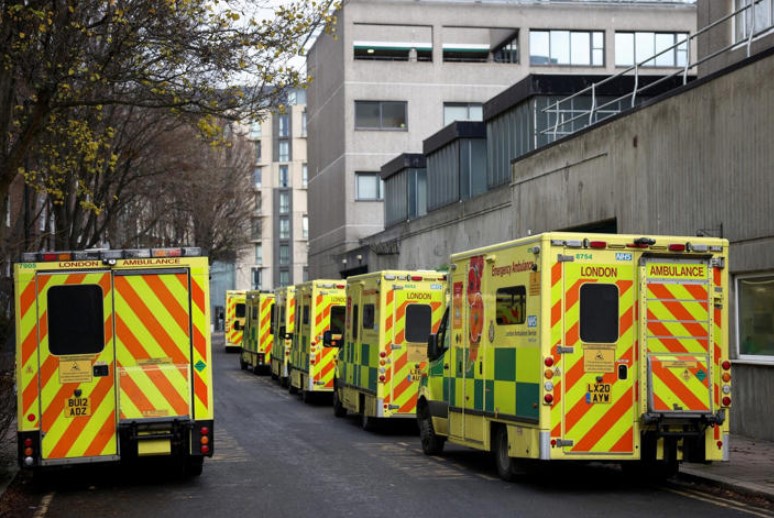Up to 500 people dying each week from emergency care delays, doctor says

Up to 500 people are dying every week because of delays in emergency care, Britain’s top accident and emergency doctor has said.
Dr Adrian Boyle, the president of the Royal College of Emergency Medicine (RCEM), said a bad flu season was compounding systemic problems, leading to hundreds of unnecessary deaths.
NHS leaders warned last week that the health service is in the grip of a “twindemic”, with soaring flu admissions and the impact of Covid “hitting staff hard”.
More than 3,700 patients a day were in hospital with flu in the last week, according to the latest figures.
Dr Boyle told Times Radio: “If you look at the graphs they all are going the wrong way, and I think there needs to be a real reset. We need to be in a situation where we cannot just shrug our shoulders and say this winter was terrible, let’s do nothing until next winter.
“We need to increase our capacity within our hospitals, we need to make sure that there are alternative ways so that people aren’t all just funnelled into the ambulance service and emergency department. We cannot continue like this – it is unsafe and it is undignified.”
He added that long waits in A&E were linked to increased mortality and somewhere between 300 to 500 people a week dying as a consequence of the delays.
It comes amid reports of a patient waiting 99 hours for a bed at Great Western Hospital, Swindon, last week. The patient came to the department via an ambulance but spent more than four days on a trolley while awaiting a bed to become available, The Sunday Times reported.
“We need to actually get a grip of this,” said Dr Boyle. “We don’t know about the waiting time figures because they don’t come out for a couple of weeks – I’d be amazed if they’re not the worst ever that we’ve seen over this December.”
Around 38,000 patients waited more than 12 hours in A&E to be admitted, according to the latest NHS figures from November, compared to around 10,000 in the same month last year.
Some 143,949 patients waited more than four hours to be admitted, around 20,000 more than the previous year.
Dr Boyle said the multiple bank holiday weekends “won’t have helped” emergency departments hit their performance targets, but added: “We went into this December with the worst ever performance against the four-hour target, and the highest ever occupancy levels in hospital.”
According to NHS standards, 95 per cent of patients should be admitted, transferred or discharged within four hours at A&E. The target has not been met since 2015.
Tobias Ellwood, a Conservative MP, said “record sums of money” have been put into the NHS “but clearly that is not enough”, adding: “What we’re seeing here is perhaps a consequence of Covid – this is a once in a generational impact, which has really tested the NHS to its limits.”
On Sunday night, another senior health official urged the Government to declare a national NHS major incident in response to the crisis, which would mean all four UK nations coordinating their response and allocating resources to meet the overwhelming demand hospitals are facing.
Dr Tim Cooksley, the president of the Society for Acute Medicine, said: “The current situation in urgent and emergency care is shocking. It is in a critical state for patients and it is an extremely difficult for healthcare staff, who are unable to deliver the care they want to.
“Political leaders across the UK need to listen, meet urgently and accept the need to declare a national NHS major incident. The outcome must be a four-nation emergency strategy that results in short-term stabilisation, medium-term improvement and long-term growth. The grave situation we are in means it will be a long journey.”
Separately, ambulance services and hospitals have warned of an oxygen shortage. In a message to staff on Friday, Hull University Teaching Hospitals NHS Trust said it was experiencing “short-term disruption” to its large oxygen cylinder supply.
“If a patient requires oxygen, they should be cared for in a bed space on their current ward where piped oxygen is available,” the message said, according to local news reports.
It follows reports that some ambulance services have been told to conserve oxygen supplies because of a national shortage of small cylinders. NHS England has insisted there is no national shortage but said the service was seeing a surge in demand.
One NHS worker in the South West told The Sunday Times: “We are now at the stage where there is not enough oxygen in cylinders to treat patients in corridors, ambulances and in our walk-in area in A&E. Combined with flu, Covid and other respiratory conditions this is beyond Third World medicine.”







